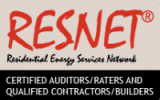Duct leakage testing plays a key role in building code compliance. With the adoption of the 2018 IRC, air leakage testing is required for all ducts in new residential construction in Denver.
e3 Power is the go-to expert for duct leakage and blower door testing in Denver and throughout the surrounding areas.
- OVER 10 YEARS OF EXPERIENCE
- 500+ DUCT BLAST TESTS COMPLETED
- CERTIFIED TECHNICIANS
WHAT IS A DUCT LEAKAGE TEST?
A duct leakage test (also known as a duct blast test) is a diagnostic test that’s used to determine the amount of air leakage occurring in a home or building’s HVAC ductwork. To perform the test and check for duct leaks, we use a blower fan to pressurize or depressurize the duct system and measure the total air leakage.
A duct leakage test can be performed at rough-in before drywall is hung, or at post-construction. However, performing the test during rough-in is highly recommended as leakage areas are more easily addressed at this time.
DUCT LEAKAGE BUILDING CODE REQUIREMENTS IN DENVER
In Denver, all ducts in new construction are required to be tested for air leakage, in accordance with the 2018 IRC.
The 2019 Denver Building And Fire Code includes the following Duct Testing Amendments:
R403.3.3 Duct testing (Mandatory). The duct work in a building or dwelling unit shall be pressure tested in accordance with ANSI/RESNET/ICC 380 or ASTM E1554 for air leakage. The maximum total leakage rate for duct in any building or dwelling unit under any compliance path shall not exceed 6.0 cubic feet per minute per 100 square feet of conditioned floor area served, (6cfm/100sqft), when the air handler is installed at the time of the test. When the air handler is not installed at the time of the test, the total leakage shall be less than or equal to 3.0 cubic feet per minute per 100 square feet of conditioned floor area; (3 cfm/100 sq ft). Registers shall be taped or otherwise sealed during the test. Testing shall be conducted at the rough-in stage or post-construction by one of the following methods:
- Rough-in test: Total leakage shall be measured with a pressure differential of 0.1 inch w.g. (25 Pa) across the system, including the manufacturer’s air handler enclosure if installed at the time of the test. Registers shall be taped or otherwise sealed during the test.
- Post-construction test: Total leakage shall be measured with a pressure differential of 0.1 inch w.g. (25 Pa) across the entire system, including the manufacturer’s air handler enclosure. Alternatively, a duct leakage test to outside conditioned space with a pressure differential of 0.1 inch w.g. (25 Pa) with reference to the outside across the entire system including the manufacturers’ air handler may be performed. Registers shall be taped or otherwise sealed during the test.
Exceptions:
- A duct air leakage test shall not be required for ducts serving ventilation systems that are not integrated with ducts serving heating or cooling systems.
- If the HVAC duct system is serving less than or equal to 1,200 square feet of conditioned floor area, the allowable duct leakage shall be 72 cubic feet per minute or less.
CODE REQUIREMENTS FOR OTHER COUNTIES IN COLORADO
For 2015 IRC code requirements and other counties outside of Denver, duct leakage testing is only required for ducts with runs through unconditioned spaces, like attics and crawlspaces. The acceptable duct leakage needed to pass is less than 4% leakage of total square footage.
HOW TO PASS A DUCT LEAKAGE TEST
Careful air sealing measures using duct mastic and HVAC foil tapes on all joints, branches, elbows etc., is needed in order pass a duct blast test.
If you do not pass your duct leakage test, we will use a theatrical smoke machine to determine where you are having air leakage issues so you can address them with proper duct sealing. The blower fan pushes the smoke through any leakage area so we can see where they are located. We will continue to work with you until you are able to pass your blower door test.
HOW MUCH DOES A DUCT BLASTER TEST COST?
Our individual duct leakage testing services start at $275 for individual tests. Multiple systems are $250 per test, both include 1.5 hours of diagnostics. Additional diagnostics time is charged at $25 per 15 minutes.



